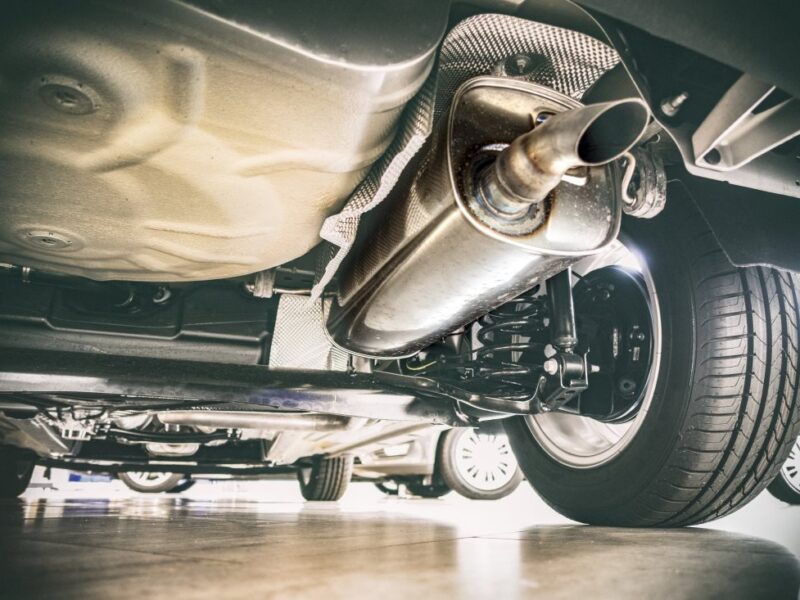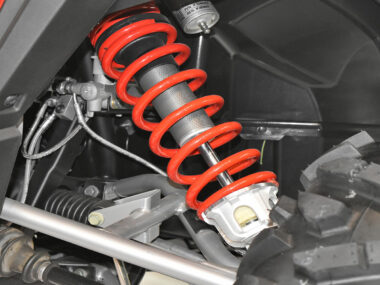How Your Vehicle Exhaust System Essentially Affects Performance and Efficiency
The vehicle exhaust system is a vital component of your car that often goes unnoticed until something goes wrong. It comprises several key parts, including the exhaust manifold, catalytic converter, muffler and exhaust pipes.
Together, these components work harmoniously to channel and manage the exhaust gases produced during engine combustion. The exhaust manifold collects gases from the engine’s cylinders, directing them into the catalytic converter, where harmful emissions are converted into less damaging substances.
The muffler then reduces engine noise before the exhaust gases are expelled through the exhaust pipe and out of the tailpipe. This efficient management of exhaust gases not only keeps your vehicle running smoothly but also plays a crucial role in minimizing environmental impact.
Maintaining a well-functioning vehicle exhaust system is essential for optimal performance and environmental responsibility. A faulty exhaust system can lead to a host of issues, including increased emissions, reduced fuel efficiency and noisy operation. Symptoms such as unusual engine noises, a noticeable decrease in fuel economy or the smell of exhaust fumes inside the vehicle are clear indicators that something might be wrong.
Regular inspections and timely repairs can prevent minor issues from escalating into major problems, ensuring that your vehicle remains efficient, performs well and contributes less to air pollution. Understanding and caring for your vehicle exhaust system not only enhances your driving experience but also supports a cleaner environment.
Key Components of a Vehicle Exhaust System
To truly appreciate how the vehicle exhaust system works, it’s essential to understand its main components:
1. Exhaust Manifold
The exhaust manifold is the initial section of the vehicle exhaust system where exhaust gases from the engine cylinders are collected. It’s often made of cast iron or stainless steel and is designed to handle high temperatures. Think of it as the entry point for exhaust gases.
2. Catalytic Converter
Next up in the vehicle exhaust system is the catalytic converter. This component plays a critical role in reducing harmful emissions. Inside the catalytic converter, a chemical reaction transforms pollutants such as carbon monoxide, hydrocarbons and nitrogen oxides into less harmful substances like carbon dioxide and nitrogen.
3. Muffler
The muffler is responsible for reducing the noise created by the engine’s exhaust gases. It works by dissipating sound waves through a series of chambers and perforated tubes. Without a muffler, your car would be incredibly noisy!
4. Exhaust Pipe
The exhaust pipe carries the gases from the catalytic converter to the rear of the vehicle. It’s a straightforward yet vital part of the vehicle exhaust system, ensuring that exhaust gases are expelled safely and efficiently.
5. Oxygen Sensors
Modern vehicle exhaust systems include oxygen sensors, which monitor the levels of oxygen in the exhaust gases. These sensors provide data to the engine control unit (ECU), helping to optimize fuel combustion and improve fuel efficiency.
How the Vehicle Exhaust System Works
Now that we’ve covered the key components, let’s take a look at how the entire vehicle exhaust system functions. When you start your vehicle, exhaust gases are created in the engine’s combustion chambers. These gases are then directed through the exhaust manifold, which collects and channels them toward the catalytic converter.
Inside the catalytic converter, a chemical reaction takes place that converts harmful emissions into less harmful substances. The gases then travel through the exhaust pipe, passing through the muffler, which reduces noise before exiting the vehicle through the tailpipe.
This entire process is designed to ensure that exhaust gases are handled efficiently, minimizing their impact on your vehicle’s performance and the environment.
Why a Properly Functioning Exhaust System Is Crucial
A well-maintained vehicle exhaust system is essential for several reasons:
1. Environmental Impact
The vehicle exhaust system helps reduce the emission of harmful pollutants into the atmosphere. A faulty exhaust system can lead to increased emissions, which contribute to air pollution and negatively impact the environment.
2. Fuel Efficiency
An efficient exhaust system helps optimize fuel combustion, which can improve your vehicle’s fuel efficiency. A clogged or damaged exhaust system can lead to poor fuel economy and increased fuel consumption.
3. Performance
A properly functioning exhaust system ensures that exhaust gases are expelled efficiently, which can enhance engine performance. A restricted exhaust system can lead to reduced engine power and overall performance issues.
4. Noise Reduction
The muffler component of the vehicle exhaust system is designed to minimize engine noise. Without a functioning muffler, your vehicle could be excessively loud and disruptive.
Signs of Exhaust System Problems
Being aware of potential issues with your vehicle exhaust system can help you address problems before they become serious. Here are some common signs of exhaust system problems:
1. Unusual Noise
If you notice a loud or unusual noise coming from your vehicle, it could be a sign of a problem with the muffler or another component of the exhaust system. A damaged muffler can lead to increased noise levels.
2. Decreased Fuel Efficiency
A drop in fuel efficiency may indicate a problem with the catalytic converter or another part of the exhaust system. If your vehicle is consuming more fuel than usual, it’s worth having the exhaust system checked.
3. Smell of Exhaust Fumes
If you smell exhaust fumes inside your vehicle, it could mean there’s a leak in the exhaust system. This is not only a sign of a problem but also a potential health hazard.
4. Engine Performance Issues
A sluggish engine or reduced power can be attributed to issues with the exhaust system. If you experience a noticeable drop in performance, it’s a good idea to have the exhaust system inspected.
Maintaining Your Vehicle Exhaust System
Regular maintenance is key to ensuring your vehicle exhaust system remains in good working order. Here are some tips for maintaining your exhaust system:
1. Regular Inspections
Have your exhaust system inspected regularly by a professional mechanic. They can identify potential issues early and ensure that all components are functioning correctly.
2. Addressing Leaks Promptly
If you notice any signs of exhaust leaks, such as unusual noises or smells, have them addressed as soon as possible. Leaks can lead to more significant problems if left untreated.
3. Keep an Eye on Performance
Monitor your vehicle’s performance and fuel efficiency. Any noticeable changes could indicate an issue with the exhaust system.
4. Avoid Rust and Corrosion
Rust and corrosion can damage exhaust system components. If you live in an area with heavy road salt or other corrosive elements, have your exhaust system checked more frequently.
The vehicle exhaust system may not be the most glamorous part of your car, but it plays a critical role in ensuring your vehicle runs efficiently, performs well and remains environmentally friendly. Understanding the components, functions and importance of the vehicle exhaust system can help you appreciate its role in your vehicle’s overall operation and encourage you to keep it in top shape.
Frequently Asked Questions
What does the vehicle exhaust system do?
The vehicle exhaust system is designed to manage and expel exhaust gases produced by the engine. It collects these gases from the engine’s combustion chambers, reduces harmful emissions through the catalytic converter, minimizes engine noise with the muffler and directs the gases out of the vehicle through the exhaust pipe and tailpipe. The system ensures efficient engine performance, reduced noise and lower environmental impact.
How often should I have my exhaust system inspected?
It’s recommended to have your exhaust system inspected at least once a year or during routine vehicle maintenance. If you notice any symptoms of potential issues, such as unusual noises, decreased fuel efficiency or the smell of exhaust fumes inside the vehicle, you should have it checked sooner. Regular inspections help identify and address problems early, preventing more serious damage and ensuring the system operates efficiently.
What are the signs of a failing exhaust system?
Common signs of a failing exhaust system include loud or unusual noises, decreased fuel efficiency, a noticeable drop in engine performance and the presence of exhaust fumes inside the vehicle. Other indicators can be rust or visible damage to exhaust system components, such as the muffler or pipes. Addressing these symptoms promptly can prevent further damage and ensure the exhaust system continues to function properly.
Can a damaged exhaust system affect my vehicle’s performance?
Yes, a damaged or faulty exhaust system can significantly impact your vehicle’s performance. Issues such as a clogged catalytic converter or a damaged muffler can lead to reduced engine power, sluggish acceleration and poor fuel economy. In severe cases, exhaust system problems can even cause engine misfires or overheating. Regular maintenance and prompt repairs can help maintain optimal performance.
How can I maintain my vehicle exhaust system?
To keep your vehicle exhaust system in good condition, schedule regular inspections with a professional mechanic, particularly if you live in areas prone to road salt or other corrosive elements. Address any leaks, rust or damage promptly and monitor your vehicle’s performance and fuel efficiency for any changes. Keeping an eye on these factors and maintaining the exhaust system proactively will help ensure its longevity and effectiveness.





